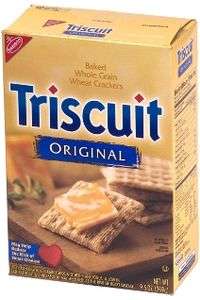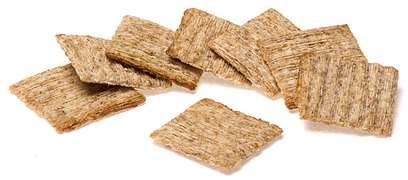Triscuit
Triscuit is a brand name of snack crackers produced by Nabisco, which take the form of square baked whole wheat wafers. They were invented in 1900, a patent was granted in 1902,[1] and the Shredded Wheat Company in Niagara Falls, New York, began production the next year.[2]
 A box of original-flavored Triscuits | |
| Nutritional value per around 6 crackers | |
|---|---|
| Energy | 502 kJ (120 kcal) |
29 g | |
| Sugars | 0 g |
| Dietary fiber | 3 g |
3.5 g | |
| Saturated | 0 g |
| Trans | 0 g |
| Monounsaturated | 1 g |
| Polyunsaturated | 2 g |
3 g | |
| Minerals | Quantity %DV† |
| Calcium | 1% 10 mg |
| Iron | 11% 1.4 mg |
| Potassium | 2% 116 mg |
| Sodium | 11% 160 mg |
| |
| †Percentages are roughly approximated using US recommendations for adults. | |
History
The Shredded Wheat Company began producing Triscuit in 1903 in Niagara Falls, New York.[2] The name Triscuit comes from a combination of the words "electricity" and "biscuit",[3] and at least one early advertisement boasted that Triscuits were "Baked by Electricity,” claiming they were "the only food on the market prepared by this 1903 process."[4] Each wafer measured 2.25 by 4 inches (5.7 cm × 10.2 cm), and remained that size for nearly twenty-one years. The ovens were then altered and the cracker size changed to 2-inch (51 mm) squares.[2]
In 1928, the Shredded Wheat Company was purchased by Nabisco.[5]
In 1935, producers began spraying the crackers with oil and adding salt. In 1984, additional flavor choices were introduced and the crackers were made crispier.[2]
Description
Triscuits are made from wheat, which is first cooked in water until it reaches about fifty percent moisture content, then tempered to allow the moisture to diffuse evenly in the grain. Slotted rollers form the grain into shredded wheat strands, which are then formed into webs. Several webs are stacked together and the still-moist stack is crimped to produce individual crackers. Oven baking then reduces the moisture content to five percent.[2] The product is currently 1.75 square inches (11.3 cm2).
Gallery
 Triscuit crackers
Triscuit crackers 1903 advertisement
1903 advertisement
References
- Perky, Henry. "Filamentous Cracker - Patent No. 713,795". Retrieved 2018-06-30.
- Hughes, Nancy. "HowStuffWorks - How Triscuits Work". Retrieved 2008-02-02.
- "It's pretty obvious that the Triscuit name is a play on the word biscuit, but it turns out the 'tri' at the beginning doesn't stand for 'three' — it's short for 'electricity'". Business Insider. 2020-03-26.
- "Triscuit: Baked by Electricity". The Montgomery Advertiser. 27 Sep 1903. Retrieved 2019-07-31.
- Smith, Andrew F. (2013-10-28). Food and Drink in American History: A "Full Course" Encyclopedia [3 Volumes]: A "Full Course" Encyclopedia. ABC-CLIO. ISBN 978-1-61069-233-5.